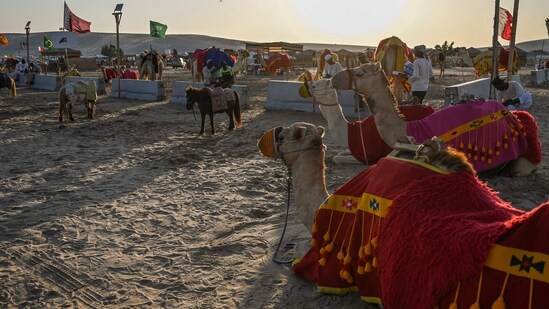Story by Stewart Carr For Mailonline • Yesterday
Football fans returning from Qatar are being advised to watch out for the signs of camel flu - a potentially lethal respiratory illness - symptoms of which include a fever, coughing and vomiting.
Middle Eastern respiratory syndrome (Mers) can be contracted through close contact with camels, according to the UK Health Security Agency.
The body has warned UK clinicians to 'be alert' to the prospect of returning World Cup fans showing signs of illness, The Times reports.
A briefing note states: 'The risk of infections to UK residents is very low but may be higher in those with exposure to specific risk factors within the region - such as to camels.

Camels are thought to be the natural host of the virus, which is from the same family as the virus behind the Covid pandemic© Provided by Daily Mail

MERS SYMPTOMS: Its symptoms include a fever, cough, breathing difficulties, diarrhoea and vomiting© Provided by Daily Mail
'Mers can be acquired from close contact with camels or from consuming camels products eg, unpasteurised camel milk.'
Other risks include close contact with an infected person. Many excited fans are reported to have enjoyed camel rides in Qatar while following England's journey in the World Cup.
Five instances of Mers have been reported in the UK to date, with the last known occurrence in August 2018.
Routine guidance was issued by the UK Health Security Agency last month, with no new cases yet reported.
The disease was first recognised in 2012 and since then, there have been 2,600 cases worldwide - mostly in the Arab peninsula, The World Health Organisation reports.
Over a third of infected patients are reported to have died. Two cases have been recorded in Qatar.
Symptoms if the disease include fever, coughing and vomiting.
Anyone coming back to Britain with tell-tale MERS symptoms, which are like that of a cold or flu, are told to seek medical advice and share their travel history, so infection control and testing can be done.
Similar measures sparked an Ebola scare in the UK last month, after a person in the UK who had been in Uganda — where the virus is roaming — developed cold-like symptoms.
There is no specific treatment for the illness, so doctors work to ease a patient's symptoms. Around 35 per cent of those who get MERS die as a result.
What is 'camel flu'?
Middle East respiratory syndrome coronavirus (MERS), also known as camel flu, is a rare but severe respiratory illness.
People can catch MERS from infected animals — though doctors say camels in the Middle East are the main source of the virus. The virus was first detected region in 2012.
It can also be transmitted through an infected person's cough droplets — but this is rare.
There have been five cases of MERS in the UK since 2012, with the most recent occurring in August 2018.
Its symptoms include a fever, cough, breathing difficulties, diarrhoea and vomiting.
There is no specific treatment for the illness, so doctors work to ease a patient's symptoms.
Around 35 per cent of those who get MERS die as a result.
UK doctors warned over deadly 'camel flu' as FIFA fans return: Report
Camel Flu In England: The UK Health Security Agency (UKHSA)
prompted doctors to look out for people suffering
from breathing difficulties and a fever.
Medical staff across England have been put on alert for signs of the deadly camel flu as FIFA World Cup fans returned from Qatar, a report said. Cases of the camel flu could now rise due to the huge numbers of fans who flocked to Qatar for the tournament and who may have been exposed to camels, The Mirror reported.
The UK Health Security Agency (UKHSA) prompted doctors to look out for people suffering from breathing difficulties and a fever. The illness is deadlier than Covid-19, with over a third of its sufferers dying, compared to less than 4 per cent of Covid sufferers, the report said.
The Sun reported a briefing note sent out by UK's health agency stating, "Clinicians and public health teams should specifically be alert to the possibility of MERS in returning travellers from the World Cup. The risk of infection to UK residents is very low but may be higher in those with exposure to specific risk factors within the region - such as to camels. MERS can be acquired from close contact with camels or from consuming camel products e.g., unpasteurised camel milk.”
The briefing also warned of "person-to-person transmission", the report said.
In Qatar this year, there have already been two cases reported, both of which had been exposed to camels, it said.
Between April 2012 and October 2022, there have been 2,600 cases in 12 countries. Of those cases, 935 people died - 36 per cent, Mirror reported.
Before the World Cup tournament started, fans had been warned to stay away from the animals for fear of catching the disease, the report added.


No comments:
Post a Comment